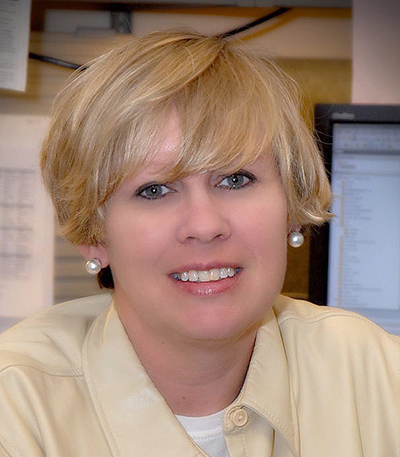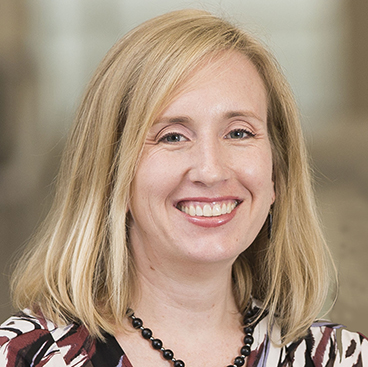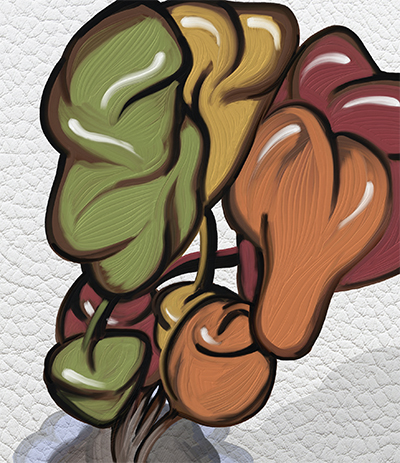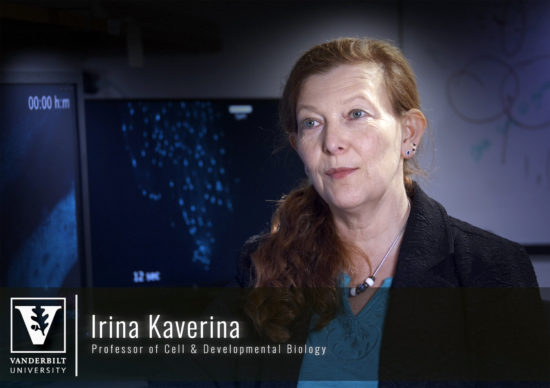NEWS
Welcome Chancellor Diermeier!
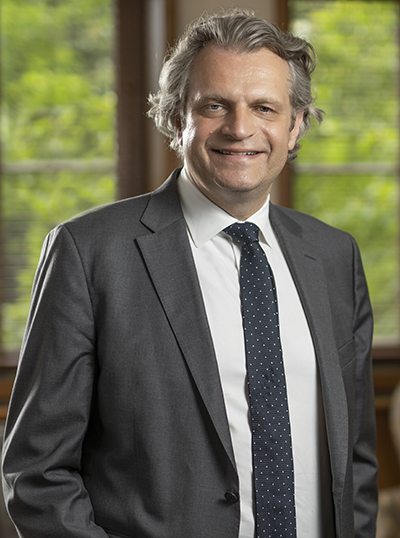 Vanderbilt’s ninth chancellor, Daniel Diermeier, began his tenure on July 1, 2020. Basic Sciences welcomes him, and invites you to learn more about the person leading our university. Vanderbilt’s ninth chancellor, Daniel Diermeier, began his tenure on July 1, 2020. Basic Sciences welcomes him, and invites you to learn more about the person leading our university.
Introducing… Vestigo!
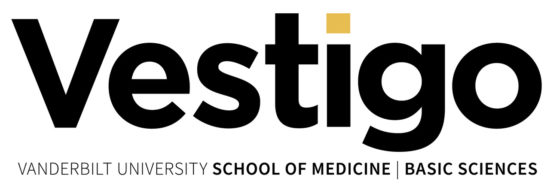 The Office of the Dean of Basic Sciences is proud to present to you its new magazine, Vestigo! In our first issue, we highlight some research discoveries led by trainees, profile provost and biomedical scientist Susan Wente, delve into the potential of multi-scale imaging, and more. We hope you enjoy reading Vestigo. And don’t forget to check out the AR component! The Office of the Dean of Basic Sciences is proud to present to you its new magazine, Vestigo! In our first issue, we highlight some research discoveries led by trainees, profile provost and biomedical scientist Susan Wente, delve into the potential of multi-scale imaging, and more. We hope you enjoy reading Vestigo. And don’t forget to check out the AR component!
Tenth issue of Results & Discussion published
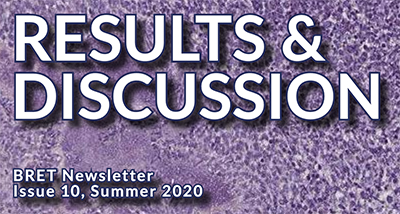 The summer 2020 issue of the Results & Discussion newsletter has just been published by the BRET Office. A partnership between R&D and Vestigo allowed student and postdoc writers to flex their writing muscles and try out different writing styles to describe the same research papers. Plus, check out an alumna profile, a faculty highlight, and an overview of Mock Interview Day, an event designed to prepare trainees to tackle the job market. The summer 2020 issue of the Results & Discussion newsletter has just been published by the BRET Office. A partnership between R&D and Vestigo allowed student and postdoc writers to flex their writing muscles and try out different writing styles to describe the same research papers. Plus, check out an alumna profile, a faculty highlight, and an overview of Mock Interview Day, an event designed to prepare trainees to tackle the job market.
Brown awarded Early Stage Investigator Research Grant Prize
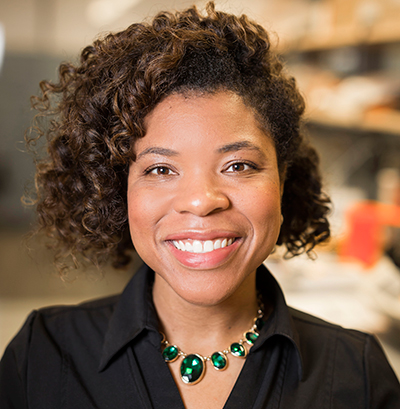 The United Mitochondrial Disease Foundation has awarded Breann Brown (Biochemistry) the Early Stage Investigator Research Grant Prize, designed to aid and inspire the next generation of scientists who dedicate their work to mitochondrial disease research. Brown’s work focuses on the maintenance of mitochondrial DNA within the context of proper organelle function and cellular respiration. The United Mitochondrial Disease Foundation has awarded Breann Brown (Biochemistry) the Early Stage Investigator Research Grant Prize, designed to aid and inspire the next generation of scientists who dedicate their work to mitochondrial disease research. Brown’s work focuses on the maintenance of mitochondrial DNA within the context of proper organelle function and cellular respiration.
Townsend Wins Camille Dreyfus Teacher-Scholar Award
 This year’s class of Camille Dreyfus Teacher-Scholar Award winners includes Assistant Professor of Chemistry Steve Townsend. The award is meant to support the careers of faculty in the chemical sciences who are in the first five years of their academic career, exhibit a strong body of research, and demonstrate a commitment to teaching. This year’s class of Camille Dreyfus Teacher-Scholar Award winners includes Assistant Professor of Chemistry Steve Townsend. The award is meant to support the careers of faculty in the chemical sciences who are in the first five years of their academic career, exhibit a strong body of research, and demonstrate a commitment to teaching.
Chancellor’s Faculty Fellows
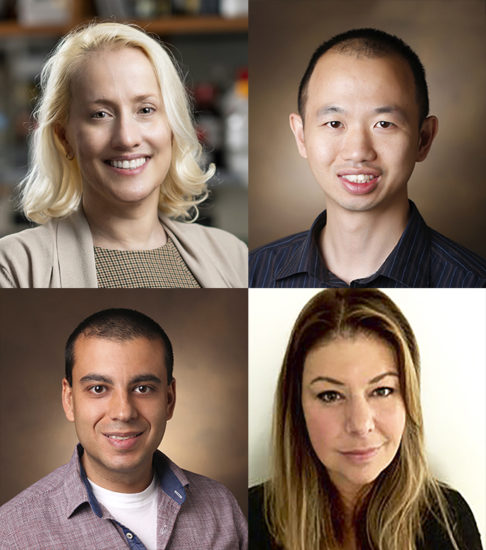 Ten faculty from across the university have been named Chancellor’s Faculty Fellows. This distinction recognizes outstanding faculty who have recently received tenure and is designed to reinforce Vanderbilt’s support for them. This year’s cohort includes Carrie Jones (Pharmacology), Ken Lau (CDB), Ivelin Georgiev (PMI), and Jennifer Below (Medicine). Ten faculty from across the university have been named Chancellor’s Faculty Fellows. This distinction recognizes outstanding faculty who have recently received tenure and is designed to reinforce Vanderbilt’s support for them. This year’s cohort includes Carrie Jones (Pharmacology), Ken Lau (CDB), Ivelin Georgiev (PMI), and Jennifer Below (Medicine).
Vanderbilt researchers recognized in list of inspiring Black scientists
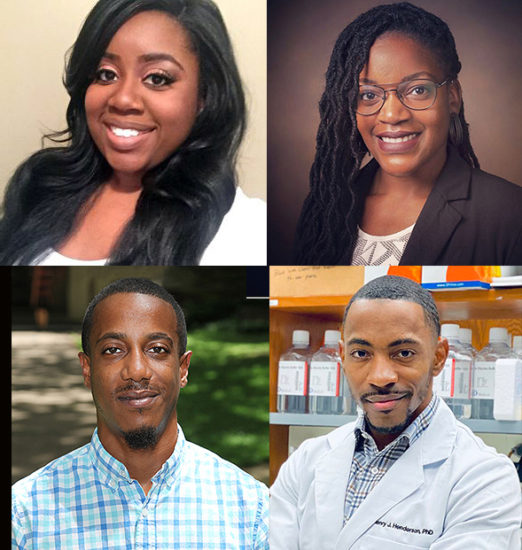 As a follow-up to the first list of 100 inspiring Black scientists published in February, a group of academics in STEM came together and compiled a list of 1,000 inspiring established and up-and-coming Black researchers. The most recently published list showcases four Vanderbilt postdoctoral scientists: Jessica Thomas, a postdoc in the lab of Roger Colbran; Lillian Brady, a postdoc in the lab of Erin Calipari; Jamaal James, a postdoc in the lab of Justin Balko; and Henry Henderson III, a postdoc in the lab of Christine Lovly. As a follow-up to the first list of 100 inspiring Black scientists published in February, a group of academics in STEM came together and compiled a list of 1,000 inspiring established and up-and-coming Black researchers. The most recently published list showcases four Vanderbilt postdoctoral scientists: Jessica Thomas, a postdoc in the lab of Roger Colbran; Lillian Brady, a postdoc in the lab of Erin Calipari; Jamaal James, a postdoc in the lab of Justin Balko; and Henry Henderson III, a postdoc in the lab of Christine Lovly.
Basic Sciences community demonstrates on Juneteenth
 In observance and celebration of Juneteenth, the anniversary of the freeing of the last enslaved Blacks in the United States in 1865, upwards of 40 or 50 faculty, trainees, and staff from the Basic Sciences community held a peaceful demonstration on June 19, 2020. If you are unfamiliar with Juneteenth, Assistant Professor of History Brandon Byrd explains it here. In observance and celebration of Juneteenth, the anniversary of the freeing of the last enslaved Blacks in the United States in 1865, upwards of 40 or 50 faculty, trainees, and staff from the Basic Sciences community held a peaceful demonstration on June 19, 2020. If you are unfamiliar with Juneteenth, Assistant Professor of History Brandon Byrd explains it here.
BWF Names Reyes Ruiz and Thomas 2020 Postdoctoral Enrichment Program Fellows
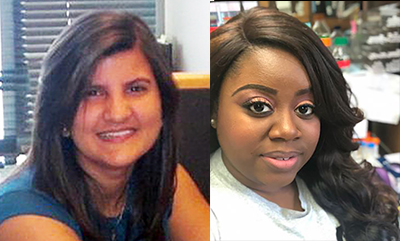 The Burroughs Wellcome Fund has announced the 2020 fellows of their Postdoctoral Enrichment Program, which include Valeria Marie Reyes Ruiz (Eric Skaar lab) and Jessica Rene Thomas (Roger Colbran lab). Reyes Ruiz and Thomas were among the 14 fellows selected from across the country, and will receive $60,000 each for enrichment activities over the course of the next 3 years. The Burroughs Wellcome Fund has announced the 2020 fellows of their Postdoctoral Enrichment Program, which include Valeria Marie Reyes Ruiz (Eric Skaar lab) and Jessica Rene Thomas (Roger Colbran lab). Reyes Ruiz and Thomas were among the 14 fellows selected from across the country, and will receive $60,000 each for enrichment activities over the course of the next 3 years.
Byndloss named finalist of NOSTER & Science Microbiome Prize
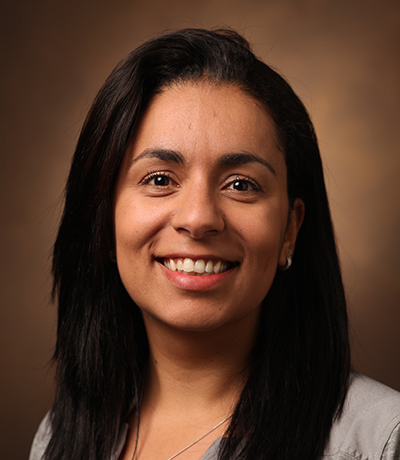 Mariana Byndloss (PMI) has been selected as a finalist for the NOSTER & Science Microbiome Prize, which judges essays describing applicants’ innovative research that reveals exciting novel functions of the microbiota and has the potential to contribute to our understanding of human or veterinary health and disease or to guide therapeutic interventions. Mariana Byndloss (PMI) has been selected as a finalist for the NOSTER & Science Microbiome Prize, which judges essays describing applicants’ innovative research that reveals exciting novel functions of the microbiota and has the potential to contribute to our understanding of human or veterinary health and disease or to guide therapeutic interventions.
Amidon selected as Vanderbilt Prize Student Scholar
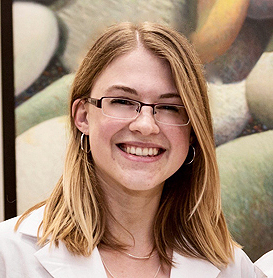 The 2020 Vanderbilt Prize Student Scholar is Katherine Amidon (Biological Sciences, Brandt Eichman lab). Amidon will receive a $1,000 prize and will be mentored by the 2020 recipient of the Vanderbilt Prize in Biomedical Science, Jennifer Doudna, of UC Berkeley. The 2020 Vanderbilt Prize Student Scholar is Katherine Amidon (Biological Sciences, Brandt Eichman lab). Amidon will receive a $1,000 prize and will be mentored by the 2020 recipient of the Vanderbilt Prize in Biomedical Science, Jennifer Doudna, of UC Berkeley.
Dean’s Award recognizes Ph.D. candidates
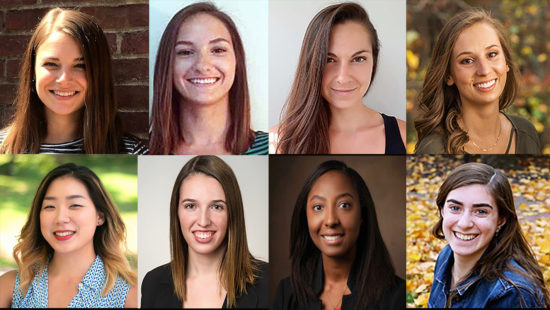 The Office of the Dean of Basic Sciences has announced the names of the eight recipients of the Dean’s Award for Exceptional Achievement: Andrea Shiakolas (MHI, Ivelin Georgiev lab), Slavina Goleva (MPB, Lea Davis lab), Kim Thibeault (Neuroscience, Erin Calipari lab), Paige Vega (CDB, Ken Lau lab), Jooeun Kang (Human Genetics, Douglas Ruderfer lab), Sarah Glass (Biochemistry, Fred Guengerich lab), Tiffany Richardson (MPB, Al Powers lab), and Anna Kasdan (Neuroscience, Reyna Gordon lab). The Office of the Dean of Basic Sciences has announced the names of the eight recipients of the Dean’s Award for Exceptional Achievement: Andrea Shiakolas (MHI, Ivelin Georgiev lab), Slavina Goleva (MPB, Lea Davis lab), Kim Thibeault (Neuroscience, Erin Calipari lab), Paige Vega (CDB, Ken Lau lab), Jooeun Kang (Human Genetics, Douglas Ruderfer lab), Sarah Glass (Biochemistry, Fred Guengerich lab), Tiffany Richardson (MPB, Al Powers lab), and Anna Kasdan (Neuroscience, Reyna Gordon lab).
Cell and Developmental Biology recognizes trainees
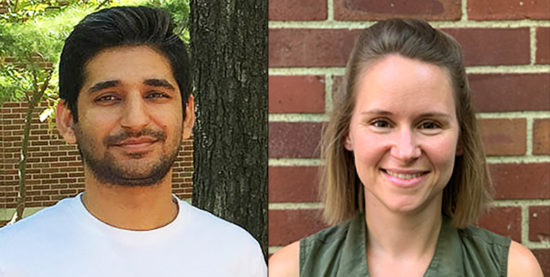 The Department of Cell and Developmental Biology annually recognizes two trainees with the Steve Hann Outstanding Graduate Student Award and the Outstanding Postdoctoral Fellow Award. This year, graduate student Nilay Taneja (CDB, Dylan Burnette lab) was digitally presented with the former award, and postdoc Beth Lawrence (Marija Zanic lab) was digitally presented with the latter. The Department of Cell and Developmental Biology annually recognizes two trainees with the Steve Hann Outstanding Graduate Student Award and the Outstanding Postdoctoral Fellow Award. This year, graduate student Nilay Taneja (CDB, Dylan Burnette lab) was digitally presented with the former award, and postdoc Beth Lawrence (Marija Zanic lab) was digitally presented with the latter.
Student and postdoc fellowships
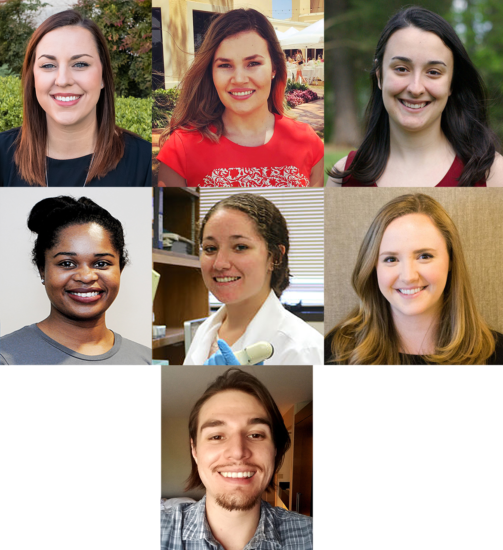 Join us in celebrating this month’s fellowship winners. The recipients and granting agencies are: Suzanne Nolan (Cody Siciliano lab) and Jennifer Zachry (Pharmacology, Erin Calipari lab), NIDA; Evonne McArthur (Human Genetics, Tony Capra lab), NHGRI; Elleansar Okwei (Chemistry, Jens Meiler lab), NIGMS; Alexandria Oviatt (CPB, Neil Osheroff lab), NIAID; Mac Castro (Biochemistry, Charles Sanders lab), NIA; and Tessa Huffstater (Biomedical Engineering, David Merryman lab), American Society of Nephrology. Join us in celebrating this month’s fellowship winners. The recipients and granting agencies are: Suzanne Nolan (Cody Siciliano lab) and Jennifer Zachry (Pharmacology, Erin Calipari lab), NIDA; Evonne McArthur (Human Genetics, Tony Capra lab), NHGRI; Elleansar Okwei (Chemistry, Jens Meiler lab), NIGMS; Alexandria Oviatt (CPB, Neil Osheroff lab), NIAID; Mac Castro (Biochemistry, Charles Sanders lab), NIA; and Tessa Huffstater (Biomedical Engineering, David Merryman lab), American Society of Nephrology.
Cuentas-Condori earns DeLill Nasser Award
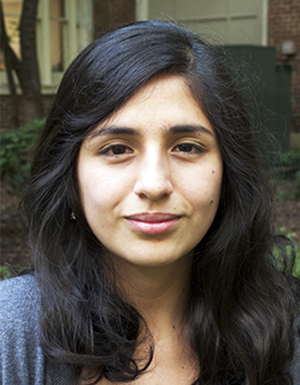 Andrea Cuentas-Condori, a graduate student in the lab of David Miller, was named one of ten recipients of the DeLill Nasser Award, presented by the Genetics Society of America. Andrea Cuentas-Condori, a graduate student in the lab of David Miller, was named one of ten recipients of the DeLill Nasser Award, presented by the Genetics Society of America.
VI4 gets a new home
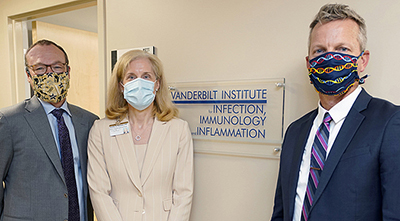
The Vanderbilt Institute for Infection, Immunology and Inflammation has a new research and administrative home on campus. Located in MCN, the new VI4 facilities house advanced imaging tools and standard resources for microbiology and immunology research as well as dedicated space for microbiome research.
A Promising Start to Ending Coronaviruses
 A webinar held on June 30 allowed Stephen Fesik (Biochemistry) to describe recent research on COVID-19. His drug discovery work has great potential for therapeutic approaches against not just COVID-19, but potentially future coronaviruses. A webinar held on June 30 allowed Stephen Fesik (Biochemistry) to describe recent research on COVID-19. His drug discovery work has great potential for therapeutic approaches against not just COVID-19, but potentially future coronaviruses.
ISAC recognizes Roe
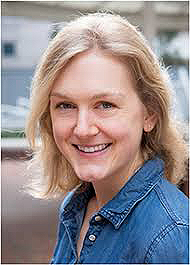 The International Society for Advancement of Cytometry has awarded Caroline Roe the title of Shared Resource Education Emerging Leader. Designation as an SRE EL comes through a highly competitive process in which designees are selected for their leadership potential, technical expertise, ability to achieve their career goals, and a commitment to ISAC. The International Society for Advancement of Cytometry has awarded Caroline Roe the title of Shared Resource Education Emerging Leader. Designation as an SRE EL comes through a highly competitive process in which designees are selected for their leadership potential, technical expertise, ability to achieve their career goals, and a commitment to ISAC.
Bhave receives Grant W. Liddle Award
 Gautam (Jay) Bhave (Medicine) has been awarded the 2020 Grant W. Liddle Award for exemplary leadership in the promotion of scientific research at VUMC. Gautam (Jay) Bhave (Medicine) has been awarded the 2020 Grant W. Liddle Award for exemplary leadership in the promotion of scientific research at VUMC.
VICB Highly Cited Articles Award
 The Vanderbilt Institute of Chemical Biology recognizes its members annually for the high impact of their scientific contributions, measured by the number of citations over a two-year period. Each corresponding author will be asked to provide a short, flash talk-style presentation at this year’s annual VICB retreat and will receive $1,000 to commemorate the accomplishment. This year’s winners are: Seth Bordenstein (Biological Sciences), with a paper on Wolbachia; Robert Coffey (Medicine), with a paper on cetuximab resistance; and Hassane Mchaourab (MPB), with a paper on P-glycoprotein. The Vanderbilt Institute of Chemical Biology recognizes its members annually for the high impact of their scientific contributions, measured by the number of citations over a two-year period. Each corresponding author will be asked to provide a short, flash talk-style presentation at this year’s annual VICB retreat and will receive $1,000 to commemorate the accomplishment. This year’s winners are: Seth Bordenstein (Biological Sciences), with a paper on Wolbachia; Robert Coffey (Medicine), with a paper on cetuximab resistance; and Hassane Mchaourab (MPB), with a paper on P-glycoprotein.
New Discoveries
Slowing down neurotransmission
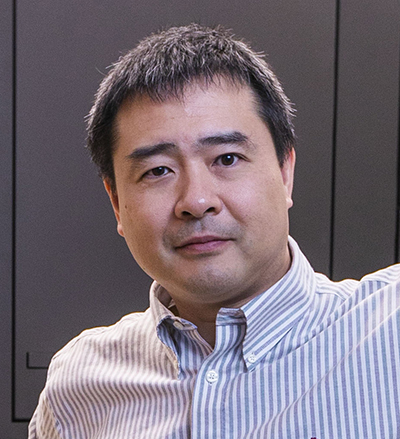 The speed of neurotransmission in different parts of the brain affects brain function. Teru Nakagawa’s (MPB) lab has found that an auxiliary subunit shared by the AMPA receptor and the GSG1L brain regulator slows down brain cell activity in the anterior thalamus. The speed of neurotransmission in different parts of the brain affects brain function. Teru Nakagawa’s (MPB) lab has found that an auxiliary subunit shared by the AMPA receptor and the GSG1L brain regulator slows down brain cell activity in the anterior thalamus.
Machine learning allows RAPID discoveries
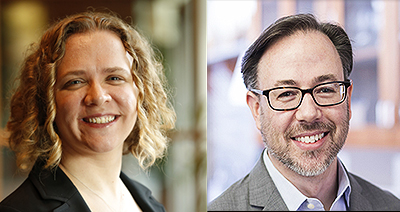 The labs of Rebecca Ihrie (CDB) and Jonathan Irish (CDB) have developed a machine learning algorithm called Risk Assessment Population IDentification that helps researchers analyze large quantities of cell data. Thanks to RAPID, the labs discovered new and aggressive types of cells involved in glioblastoma. The labs of Rebecca Ihrie (CDB) and Jonathan Irish (CDB) have developed a machine learning algorithm called Risk Assessment Population IDentification that helps researchers analyze large quantities of cell data. Thanks to RAPID, the labs discovered new and aggressive types of cells involved in glioblastoma.
Developing tools to study NAEs
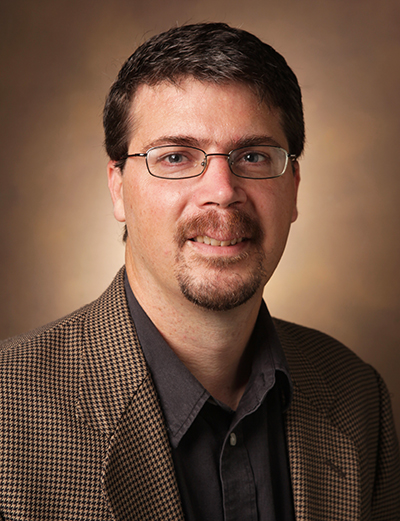 NAEs, bioactive lipids, appear to play roles in energy balance, inflammation, stress responses and addiction, but scientists have not yet found defined roles for them. The lab of Sean Davies (Pharmacology) identified two inhibitors of an enzyme involved in NAE biosynthesis that can help characterize NAE function. NAEs, bioactive lipids, appear to play roles in energy balance, inflammation, stress responses and addiction, but scientists have not yet found defined roles for them. The lab of Sean Davies (Pharmacology) identified two inhibitors of an enzyme involved in NAE biosynthesis that can help characterize NAE function.
Sin3 proteins linked to diabetes
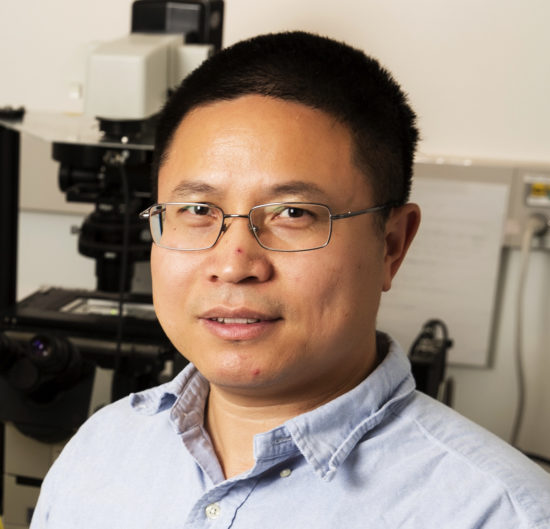 The lab of Guoqiang Gu (CDB) recently determined that Sin3 proteins Sin3a and Sin3b play essential roles in islet cell production and postnatal beta cell “fitness,” linking their function to the initiation and progression of diabetes. The lab of Guoqiang Gu (CDB) recently determined that Sin3 proteins Sin3a and Sin3b play essential roles in islet cell production and postnatal beta cell “fitness,” linking their function to the initiation and progression of diabetes.
Mitochondrial dynamics affect human cardiomyocytes
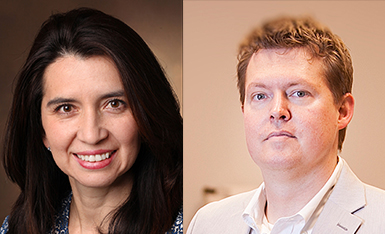 Work from the labs of Vivian Gama (CDB) and Dylan Burnette (CDB) shows that disrupting mitochondrial morphology and dynamics through the inhibition of MCL-1 leads to a decrease in viability and function of iPSC-derived cardiomyocytes. Work from the labs of Vivian Gama (CDB) and Dylan Burnette (CDB) shows that disrupting mitochondrial morphology and dynamics through the inhibition of MCL-1 leads to a decrease in viability and function of iPSC-derived cardiomyocytes.
Monoclonal antibodies show promise against COVID-19

James Crowe’s (Pediatrics) group, which specializes in the discovery of antibodies against viral infections, isolated monoclonal antibodies from one of the earliest confirmed SARS-CoV-2 infections in North America. Their trademark approach also allowed them to isolate a monoclonal antibody that could protect against the enterovirus-linked acute flaccid myelitis.
Mouse model for a seizure disorder
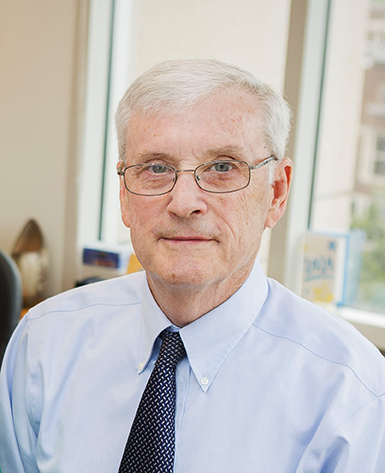 The lab of Robert Macdonald (Neurology) recently developed a mouse model with a GABA-A receptor subunit point mutation that mimics some abnormal behaviors and seizures seen in Lennox-Gastaut syndrome in humans. The lab of Robert Macdonald (Neurology) recently developed a mouse model with a GABA-A receptor subunit point mutation that mimics some abnormal behaviors and seizures seen in Lennox-Gastaut syndrome in humans.
Mutating for better binding
 Recent work by Ingrid Verhamme (PMI) and colleagues suggests that Staphylococcus aureus might change staphylocoagulase, a virulence factor, to better bind to prothrombin and evade the immune system. Recent work by Ingrid Verhamme (PMI) and colleagues suggests that Staphylococcus aureus might change staphylocoagulase, a virulence factor, to better bind to prothrombin and evade the immune system.
Positive results from Phase 1 COVID-19 vaccine trial
 A cross-institutional Phase 1 trial for a COVID-19 vaccine has yielded promising results that were recently published in the New England Journal of Medicine. Mark Denison (Medicine) was the Vanderbilt lead for the trial, which will begin recruiting Phase 3 volunteers at Vanderbilt and the Vanderbilt University Medical Center. A cross-institutional Phase 1 trial for a COVID-19 vaccine has yielded promising results that were recently published in the New England Journal of Medicine. Mark Denison (Medicine) was the Vanderbilt lead for the trial, which will begin recruiting Phase 3 volunteers at Vanderbilt and the Vanderbilt University Medical Center.
Volunteer for a COVID-19 vaccine Phase 3 trial
VUMC is recruiting volunteers for a randomized, placebo-controlled phase 3 trial of the COVID-19 vaccine under development by Moderna, Inc. The trial will be open to people 18 years old and older. Participants will receive two shots of either the vaccine or an inactive placebo and will be followed for two years.
Stimulating STING to enhance neuroblastoma treatment
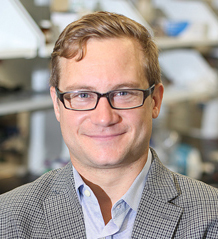 John Wilson’s (Chemical and Biomolecular Engineering) group recently showed that treating neuroblastoma cells with a stimulant of the STING pathway enhanced the immune reaction against the cancerous cells. John Wilson’s (Chemical and Biomolecular Engineering) group recently showed that treating neuroblastoma cells with a stimulant of the STING pathway enhanced the immune reaction against the cancerous cells.
| ![CAS - Basic Sciences - Internal E-Newsletter [Vanderbilt University]](https://cdn.vanderbilt.edu/vu-URL/wp-content/uploads/sites/119/2021/04/19142723/basically-speaking-banner-04-2021.jpg)
 Vanderbilt’s ninth chancellor, Daniel Diermeier, began his tenure on July 1, 2020. Basic Sciences welcomes him, and invites you to
Vanderbilt’s ninth chancellor, Daniel Diermeier, began his tenure on July 1, 2020. Basic Sciences welcomes him, and invites you to  The Office of the Dean of Basic Sciences is proud to present to you its new magazine,
The Office of the Dean of Basic Sciences is proud to present to you its new magazine,  The
The  The
The  This year’s class of
This year’s class of  Ten faculty from across the university have been named
Ten faculty from across the university have been named  As a follow-up to the first list of
As a follow-up to the first list of  In observance and celebration of
In observance and celebration of  The Burroughs Wellcome Fund has
The Burroughs Wellcome Fund has  Mariana Byndloss (PMI) has been
Mariana Byndloss (PMI) has been  The 2020
The 2020  The Office of the Dean of Basic Sciences has announced the names of the
The Office of the Dean of Basic Sciences has announced the names of the  The Department of Cell and Developmental Biology annually recognizes two trainees with the Steve Hann Outstanding Graduate Student Award and the Outstanding Postdoctoral Fellow Award. This year, graduate student Nilay Taneja (CDB, Dylan Burnette lab) was digitally presented with the former award, and postdoc Beth Lawrence (Marija Zanic lab) was digitally presented with the latter.
The Department of Cell and Developmental Biology annually recognizes two trainees with the Steve Hann Outstanding Graduate Student Award and the Outstanding Postdoctoral Fellow Award. This year, graduate student Nilay Taneja (CDB, Dylan Burnette lab) was digitally presented with the former award, and postdoc Beth Lawrence (Marija Zanic lab) was digitally presented with the latter. Join us in celebrating this month’s fellowship winners. The recipients and granting agencies are: Suzanne Nolan (Cody Siciliano lab) and Jennifer Zachry (Pharmacology, Erin Calipari lab), NIDA; Evonne McArthur (Human Genetics, Tony Capra lab), NHGRI; Elleansar Okwei (Chemistry, Jens Meiler lab), NIGMS; Alexandria Oviatt (CPB, Neil Osheroff lab), NIAID; Mac Castro (Biochemistry, Charles Sanders lab), NIA; and Tessa Huffstater (Biomedical Engineering, David Merryman lab), American Society of Nephrology.
Join us in celebrating this month’s fellowship winners. The recipients and granting agencies are: Suzanne Nolan (Cody Siciliano lab) and Jennifer Zachry (Pharmacology, Erin Calipari lab), NIDA; Evonne McArthur (Human Genetics, Tony Capra lab), NHGRI; Elleansar Okwei (Chemistry, Jens Meiler lab), NIGMS; Alexandria Oviatt (CPB, Neil Osheroff lab), NIAID; Mac Castro (Biochemistry, Charles Sanders lab), NIA; and Tessa Huffstater (Biomedical Engineering, David Merryman lab), American Society of Nephrology. Andrea Cuentas-Condori, a graduate student in the lab of David Miller, was named one of
Andrea Cuentas-Condori, a graduate student in the lab of David Miller, was named one of 
 A
A  The International Society for Advancement of Cytometry has awarded
The International Society for Advancement of Cytometry has awarded  Gautam (Jay) Bhave (Medicine)
Gautam (Jay) Bhave (Medicine)  The Vanderbilt Institute of Chemical Biology recognizes its members annually for the high impact of their scientific contributions, measured by the number of citations over a two-year period. Each corresponding author will be asked to provide a short, flash talk-style presentation at this year’s annual VICB retreat and will receive $1,000 to commemorate the accomplishment. This year’s winners are: Seth Bordenstein (Biological Sciences), with a
The Vanderbilt Institute of Chemical Biology recognizes its members annually for the high impact of their scientific contributions, measured by the number of citations over a two-year period. Each corresponding author will be asked to provide a short, flash talk-style presentation at this year’s annual VICB retreat and will receive $1,000 to commemorate the accomplishment. This year’s winners are: Seth Bordenstein (Biological Sciences), with a  The speed of neurotransmission in different parts of the brain affects brain function. Teru Nakagawa’s (MPB) lab has found that an auxiliary subunit shared by the AMPA receptor and the GSG1L brain regulator
The speed of neurotransmission in different parts of the brain affects brain function. Teru Nakagawa’s (MPB) lab has found that an auxiliary subunit shared by the AMPA receptor and the GSG1L brain regulator  The labs of Rebecca Ihrie (CDB) and Jonathan Irish (CDB) have developed a
The labs of Rebecca Ihrie (CDB) and Jonathan Irish (CDB) have developed a  NAEs, bioactive lipids, appear to play roles in energy balance, inflammation, stress responses and addiction, but scientists have not yet found defined roles for them. The lab of Sean Davies (Pharmacology) identified
NAEs, bioactive lipids, appear to play roles in energy balance, inflammation, stress responses and addiction, but scientists have not yet found defined roles for them. The lab of Sean Davies (Pharmacology) identified  The lab of Guoqiang Gu (CDB) recently determined that
The lab of Guoqiang Gu (CDB) recently determined that  Work from the labs of Vivian Gama (CDB) and Dylan Burnette (CDB) shows that disrupting mitochondrial morphology and dynamics through the
Work from the labs of Vivian Gama (CDB) and Dylan Burnette (CDB) shows that disrupting mitochondrial morphology and dynamics through the 
 The lab of Robert Macdonald (Neurology) recently
The lab of Robert Macdonald (Neurology) recently  Recent work by Ingrid Verhamme (PMI) and colleagues suggests that Staphylococcus aureus might
Recent work by Ingrid Verhamme (PMI) and colleagues suggests that Staphylococcus aureus might  A cross-institutional Phase 1 trial for a COVID-19 vaccine has yielded
A cross-institutional Phase 1 trial for a COVID-19 vaccine has yielded  John Wilson’s (Chemical and Biomolecular Engineering) group recently showed that treating neuroblastoma cells with a
John Wilson’s (Chemical and Biomolecular Engineering) group recently showed that treating neuroblastoma cells with a 
